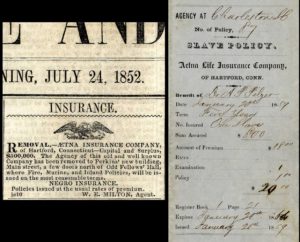Negro Insurance. Aetna’s front page ad for “Negro Insurance,” at left, follows soon after the company’s 1850 inception. Memphis Daily Eagle and Advertiser, July 24, 1852.
At right, a very scarce, Aetna “SLAVE POLICY” from 1859, indemnifies Dr. A.P. Pelzer, of Charleston, SC, for $800 in the event his house servant Jacob dies. It does not cover his running away or theft.
While Aetna’s policies were never underwritten for humanitarian purposes, they tended to protect the welfare of slaves by exclusions forfeiting coverage for “neglect, abuse, or maltreatment of [sic] the owner, or anyone to whom he, she, or they shall be intrusted [sic],” or engaged “in any more hazardous occupations, [or] taken to more Southern localities.”
In 2000, Aetna apologized, claiming it never insured more than 18 slaves. However, policies appear to be numbered by region of issue rather than date. Judging by the 1852 ad, an 1854 policy No. 158 (shown in a 1956 book about Aetna), and Dr. Pelzer’s 1859 policy No. 87, it is likely that hundreds, if not thousands of slaves, had been insured. Another issuer, Nautilus, later became New York Life.


